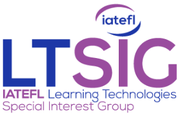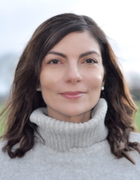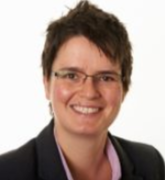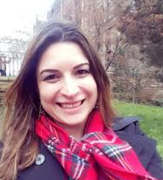

Moderation: Sophia Mavridi/ Heike Philp
Introduction to LTSIG by Sophia Mavridi, IATEFL LTSIG Coordinator.
RECORDING (55min): http://lancelot.adobeconnect.com/pklbetpkmc7j/
Sophia Mavridi is an Educational Technology & EAP lecturer, teacher trainer and researcher. She has been involved in various ELT roles since 1998 as Primary & Secondary school EFL teacher, Director of Studies, examiner and consultant.
She is the IATEFL Learning Technologies SIG Co-ordinator, a special interest group focusing on the pedagogically sound application of technology to language teaching. Her research interests lie in the areas of Digital Pedagogies, Media Literacies and Digital Ethics and their role in Digital Language Learning.

Sarah Rogerson
The potential for VR and AR in the language classroom
RECORDING (55min): http://lancelot.adobeconnect.com/pklbetpkmc7j/
New technologies afford new possibilities to language learning and assessment. The power of Virtual and Augmented Reality holds enormous potential for the language classroom in terms of immersive, situated learning and assessment. This talk will explore why and how these technologies should be incorporated into language learning and assessment to engage and motivate the 21st century student.
Sarah Rogerson leads the Assessment Development team at Cambridge Assessment: English. She is a passionate advocate of using new technologies for widening access to learning and assessment and has pioneered the use of immersive technologies for reducing language test anxiety. Her thoughts on the potential of immersive technologies in language learning can be seen in the chapter: Imagining the potential for using Virtual Reality technologies in Language Learning in the 2017 TIRF volume. Currently studying for an MSC in digital education, she works across a suite of innovative products aimed at reimagining how we assess language.

Integrating Virtual Reality to EFL teaching
Raquel Ribeiro
RECORDING (35min): http://lancelot.adobeconnect.com/pem3g97csdxx/
What is your understanding of Virtual Reality? How far can we take our students in their LX learner experience of EFL?
In this workshop I intend to share with the audience how to make the integration of VR-based task with language development purposes as a target and have the participants experience the learner perspective.
Bio
Raquel is an EFL teacher and EdTech blogger from Brazil. She is a lecturer and teacher trainer on the field of mobile technology for educational purposes. She is also a sub committee member for the IATEFL learning Technologies SIG, an Innovator and Mentor certified by Google as well as an EFL teacher at Cultura Inglesa Sao Paulo, Brazil.
She is passionate about the potential technology has to enhance the learning and to promote the inclusion of blind and visually impaired students.
Instagram https://www.instagram.com/informed_teachers_blog/?hl=en
Twitter @Rach_Ribeiro
Heike Philp
Back to the future: From virtual worlds to virtual reality
RECORDING (24min): http://lancelot.adobeconnect.com/pc3pspzxrfu1/
From virtual worlds to virtual reality is a journey into the history of 3D environments. It talks about prims and mesh, facts and fiction, ease of use, features & co. During her talk, Heike Philp, co-owner of EduNation in Second Life and ‘inworlder’ since 2006 will outline 10 years of research and development of language teaching and learning in immersive environments.
After a brief jump back in time, the presentation will continue to explore immersive learning through Virtual Reality. What are the affordances of VR and what are the constraints? How does VR differ from virtual worlds? How can VR be explored for languages learning and how can it be used in a classroom setting, given the fact that perhaps only one high end VR headset (Occulus/ HTC Vive etc.) might be available?
Heike Philp CEO of let’s talk online sprl in Brussels, a live online technology provider in the field of language learning in real-time via internet. She is co-initiator of EU funded LANCELOT, AVALON and CAMELOT and her latest project GUINEVERE about language games in virtual environments started in Dec 2017.
SPECIAL GUESTS
Öznur Özdal, Ege Kumlalı, Ekin Küçük, Batuhan Küçük
“Alchemist”
RECORDING (32min): http://lancelot.adobeconnect.com/p77mtx9pivs9/
Alchemist is an educational game that takes advantage of the immersive structure of VR and creates an exciting and unique experience for the language learners. The demo has a magical theme that provides three different levels with three different modes of interaction to teach players Spanish vocabulary. This game was the winning application of a Hackathon in Istanbul by Goethe Institut. The winners were invited to present their VR game in Berlin.
Öznur Özdal is a Spanish teacher and a student in Game Design M.A. program in Bahçeşehir University. She studies to work as a game content / narrative designer. She is also interested in audio design.
Batuhan Küçük graduated from the animation department of Plato School of Visual Arts in 2014. He works as a 3d environment artist.
Ege Kumlalı is a student in game design M.A. program in Bahçeşehir University. She works as a 3d designer.
Ekin Küçük is a computer engineering student. He works as a programmer of core game mechanics.
